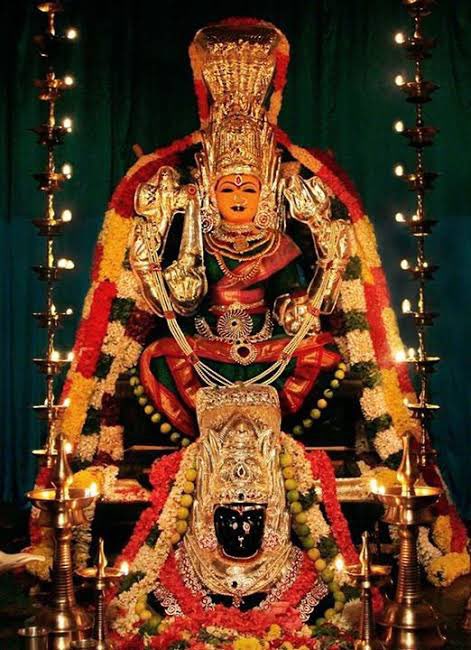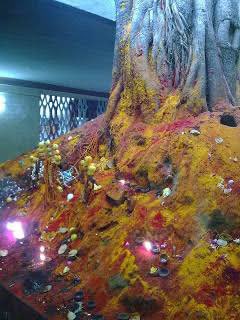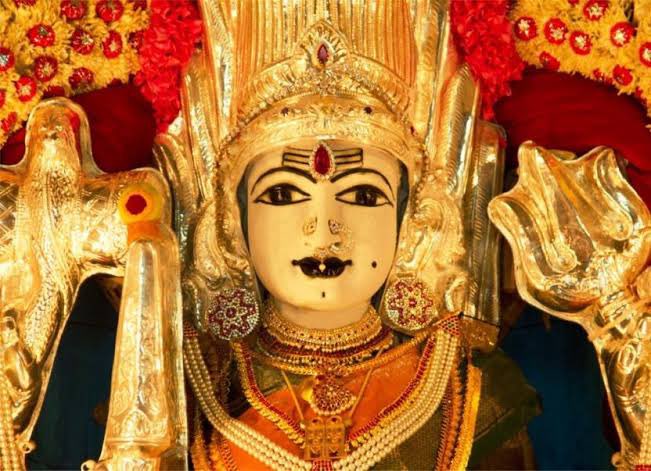1) The Holy Prophet had told Imam Ali: "Your position is like that of Ka'bah. People (Muslims) go to Ka'bah but that august House never approaches anyone. Therefore after my death, if people come to you and swear the oath of allegiance you accept it,
A Thread On Reasons Behind
《Silence Of Ali(AS)After Saqifa》
1) The Holy Prophet had told Imam Ali: "Your position is like that of Ka'bah. People (Muslims) go to Ka'bah but that august House never approaches anyone. Therefore after my death, if people come to you and swear the oath of allegiance you accept it,
Usudul Ghabah fi Tamizis Sahaba, Allama Ali ibn Muhammad, vol. IV, p.31;
2) The Holy Prophet had advised Imam Ali(a) that,"After me you will have to face severe sufferings, but do not
Madarijun Nabuwwah, Abdul Haq Muhaddith Dehlavi, vol. II, p. 511.
1)When Holy Prophet(PBUH) Told Imam Ali(AS) That People Will Go Astray After Him Then Imam Ali(AS) Asked Holy Prophet(PBUH) What Should he Do
2)In Rijal Kashi, It Is Mentioned That Only 3 Sahaba Were Present Before Zohr Prayer's and After That Ammar(RA) came

1)Salman
2)Ammar
3)Miqdad
4)AbuZar
(Mentioned In Rijal Kashi)
3)Sermon Of Imam Ali(AS) In Nahjul Balagha
Then, I looked and found that there is no supporter for me except my family {ahla bayti}, so I refrained from thrusting them unto death.”
people then had newly embraced Islam and the religion was like a goatskin full of milk which has frothed and the least sluggishness and negligence would spoil it and the trivial difference would turn it upside down
Sharh Nahj al-Balaghah, vol. 1, p. 308.
MoreOver He Also Fought During Their Time In Incident Of "Radha"

After the demise of the Prophet (S), a large number of the Arab tribes that had accepted Islam during the last years of the Prophet’s (S) life turned back from the religion and became apostate, and this danger always seriously
I swear by Allah that at that juncture it could not even be imagined that the Arabs would snatch the seat of the caliphate from the
I felt afraid that, even after seeing and recognizing the evil, if I did not stand up to help Islam and the Muslims it would be a worse calamity to me than my losing authority
3.Najh al-Balaghah, Letter 62
Ali ibn al-Husayn Abu’l-Faraj al-Isfahani, Maqatil at-Talibiyyin (Qum: Manshurat ash-Sharif ar-Radi)
(Muhammad ibn Muhammad ibn an-Nu‘man Mufid, Al-Jamal, 2nd edition (Qum: Maktab al-A‘lam al-Islami (Central Publication), 1416 AH), pp. 118-119)
فَنَظَرْتُ فِإِذا لَيسَ لي مُعينٌ إلاّ أهلُ بَيتى فَضَنَنْتُ بِهِمْ عَنِ المَوْتِ.
“Then, I looked and found that there is no supporter for me except my family {ahla bayti}, so I refrained from thrusting them unto death
Najh al-Balaghah, Sermon 26.
Although ‘Ali (‘a) distanced himself from the political scene with the formation of Saqifah, the Shi‘ah in the form of a particular group with a particular political orientation was formed after the
They first gathered in Fatimah’s(‘a) house and refused to pay allegiance as they faced the onslaught of the Saqifah architects
Ahmad ibn Abi Ya‘qub ibn Wadhih, Tarikh al-Ya‘qubi, 1st edition vol.2,p. 126.
I missed the cases regarding Saqifah. As I went to the Mosque of the Prophet (S), I saw
Ibn Abi’l-Hadid, Sharh Nahj al-Balaghah, vol. 2, p. 51.
Finally, on that Friday, the Shi‘ah of ‘Ali (‘a) went to the Prophet’s (S) Mosque to debate with and condemn Abubakr. In this regard, Tabarsi thus narrates
They gathered in a certain place and discussed together the event in
After their argumentation, Abubakr descended from the pulpit, went to his house and did not go out for three days until such time that Khalid
(Abi Mansur Ahmad ibn ‘Ali ibn Abi Talib Tabarsi, Al-Ihtijaj vol. 1, pp. 186-200)
In addressing ‘Ali (‘a), Khalid ibn Sa‘id said: “Come forward so that I could pay my allegiance to you as you are the most deserving person in the position of Muhammad (S).
Abd Allah ibn Mas‘ud used to say, “Based on the injunction of the Qur’an, there are four caliphs, viz. Adam (Adam), Dawud (David), Harun (Aaron), and ‘Ali.”
(Manaqib Al Abi Talib,vol. 3, pp. 77-78)
More from Society
The UN just voted to condemn Israel 9 times, and the rest of the world 0.
View the resolutions and voting results here:
The resolution titled "The occupied Syrian Golan," which condemns Israel for "repressive measures" against Syrian citizens in the Golan Heights, was adopted by a vote of 151 - 2 - 14.
Israel and the U.S. voted 'No' https://t.co/HoO7oz0dwr
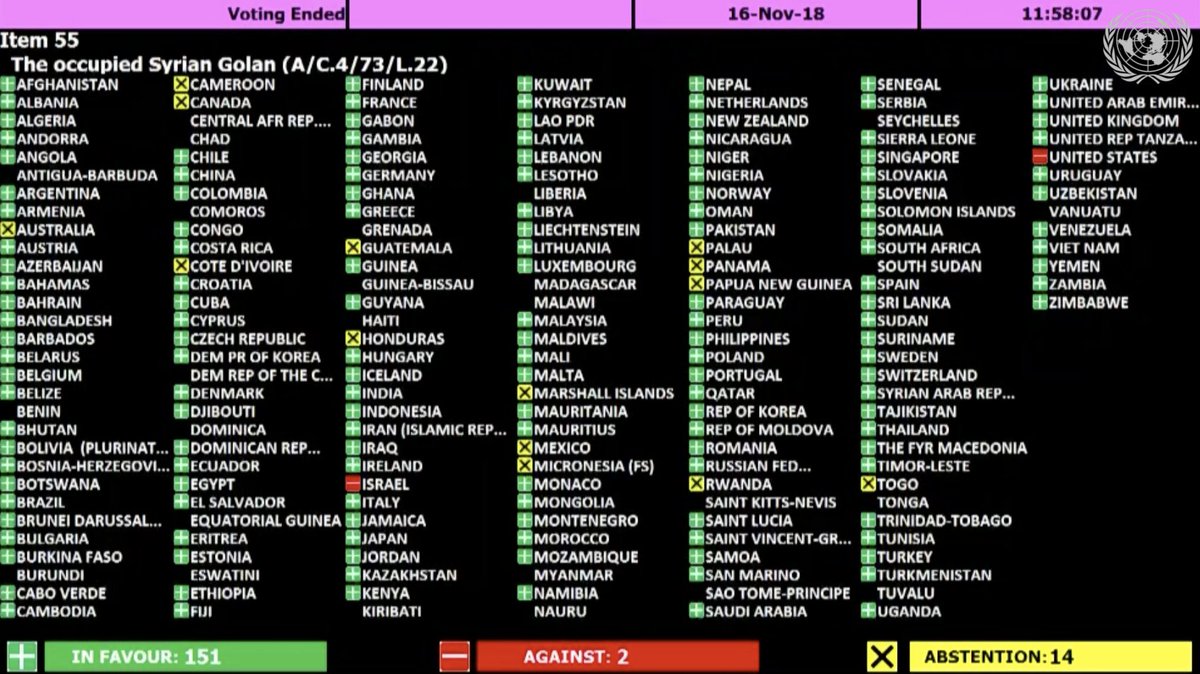
The resolution titled "Israeli practices affecting the human rights of the Palestinian people..." was adopted by a vote of 153 - 6 - 9.
Australia, Canada, Israel, Marshall Islands, Micronesia, and the U.S. voted 'No' https://t.co/1Ntpi7Vqab
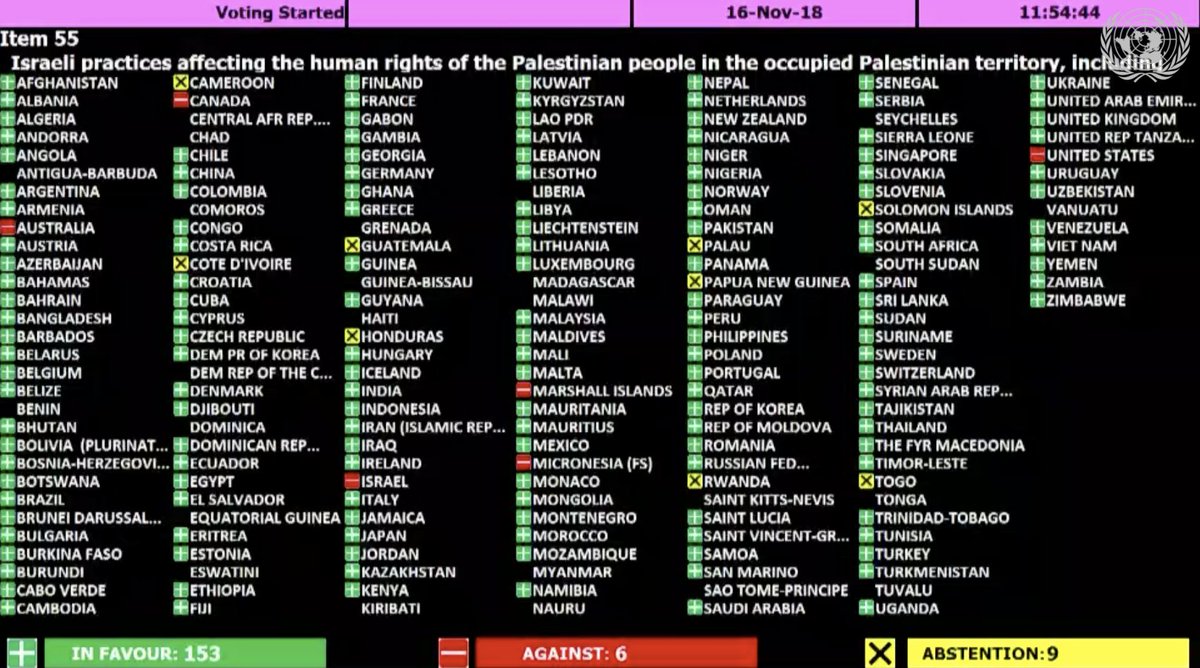
The resolution titled "Israeli settlements in the Occupied Palestinian Territory, including East Jerusalem, and the occupied Syrian Golan" was adopted by a vote of 153 – 5 – 10.
Canada, Israel, Marshall Islands, Micronesia, and the U.S. voted 'No'
https://t.co/REumYgyRuF
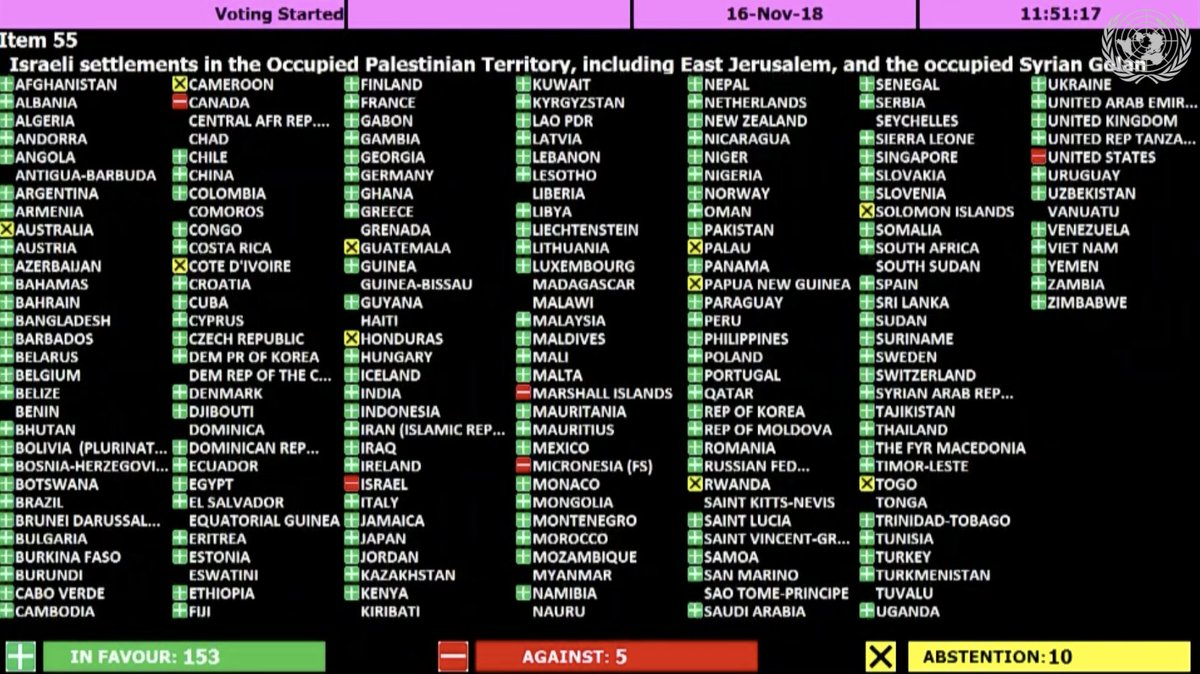
The resolution titled "Applicability of the Geneva Convention... to the
Occupied Palestinian Territory..." was adopted by a vote of 154 - 5 - 8.
Canada, Israel, Marshall Islands, Micronesia, and the U.S. voted 'No'
https://t.co/xDAeS9K1kW
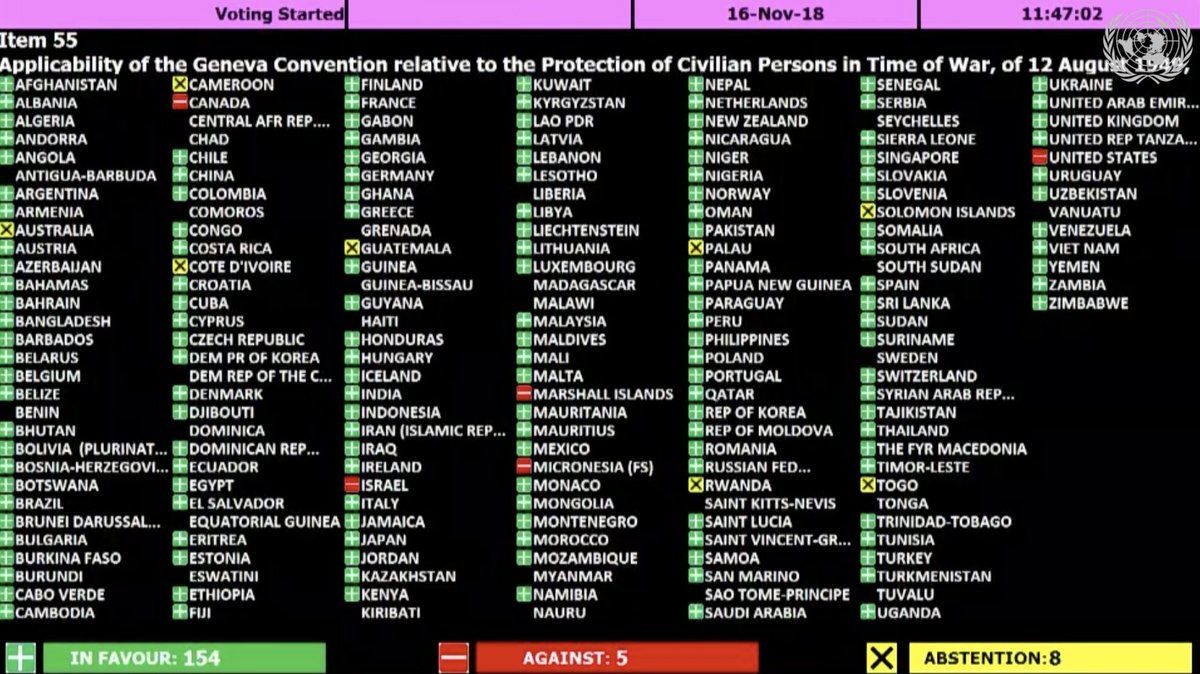
View the resolutions and voting results here:
The resolution titled "The occupied Syrian Golan," which condemns Israel for "repressive measures" against Syrian citizens in the Golan Heights, was adopted by a vote of 151 - 2 - 14.
Israel and the U.S. voted 'No' https://t.co/HoO7oz0dwr

The resolution titled "Israeli practices affecting the human rights of the Palestinian people..." was adopted by a vote of 153 - 6 - 9.
Australia, Canada, Israel, Marshall Islands, Micronesia, and the U.S. voted 'No' https://t.co/1Ntpi7Vqab

The resolution titled "Israeli settlements in the Occupied Palestinian Territory, including East Jerusalem, and the occupied Syrian Golan" was adopted by a vote of 153 – 5 – 10.
Canada, Israel, Marshall Islands, Micronesia, and the U.S. voted 'No'
https://t.co/REumYgyRuF

The resolution titled "Applicability of the Geneva Convention... to the
Occupied Palestinian Territory..." was adopted by a vote of 154 - 5 - 8.
Canada, Israel, Marshall Islands, Micronesia, and the U.S. voted 'No'
https://t.co/xDAeS9K1kW

















